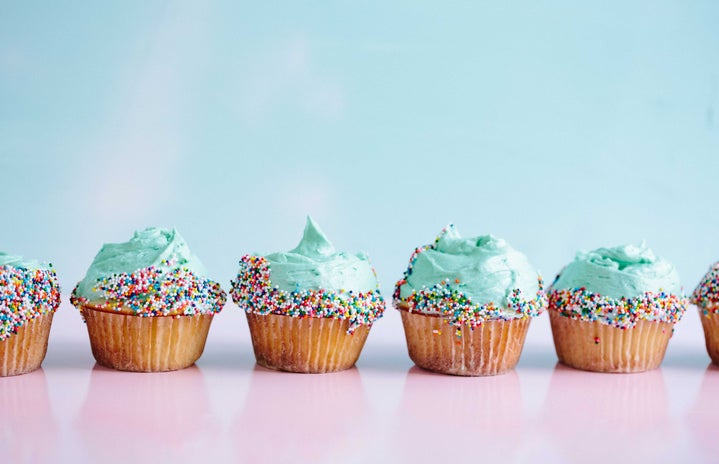Author’s Note: Diet culture has enforced the belief that there are “good” foods to eat more of and “bad” foods to avoid. In reality, different foods just provide different nutrients, and placing labels on the food we eat only encourages shame and disordered eating. This article discusses altering a diet while trying to avoid these harmful labels, but it still may be triggering. If you or a loved one is struggling with an eating disorder, know that you’re not alone and know that there are resources to help, such as your college’s counseling center or the National Eating Disorder hotline.
Background
For my entire life, I have always had a sweet tooth. Candy, cake, and any sweets were my favorite treat growing up, and I even worked in a candy store in high school. However, despite how good it tastes, I often felt sluggish and tired after the sugar high always wears off. With the new independence that comes with driving and shopping on my own, I found myself buying more sweet things as a quick pick me up.
However, I also love cooking, and when I eat more fresh foods, I feel more energetic and overall less sluggish. I still have a massive sweet tooth, but over winter break, I found myself wondering how much sugar I was actually eating.

The Science
The American Heart Association recommends that men consume no more than 36 grams and women have no more than 25 grams of added sugar per day. Processed sugar, found in everything from cereal, bread, and snacks to candy and granola bars, is broken down in the body faster than natural sugars found in foods like fruit. The quick spike in blood sugar means you are more likely to crash, and can leave you feeling tired and craving more.
My Experience
Studies have shown that sugar is addictive, and I know that has definitely been true for me. Some of my favorite comfort foods are ones with tons of sugar — a normal bag of Sour Patch Kids has 84 grams of sugar! I decided to see if sugar was really making me tired and foggy, and decided to cut out all processed sugar for two weeks.
For the first few days, I relied on dried fruit and dates to keep myself from going crazy from the sugar withdrawals. It definitely wasn’t easy, but after the first few days of intense cravings, I found myself gravitating towards less processed foods. It was also hard to cut out sweetener from my coffee, but I found that adding cinnamon and oat milk still kept my drinks fun and less bitter. Since most of my favorite snacks contain processed sugar, I ended up eating a lot of fresh fruits, veggies, cheese, smoothies, and homemade meals, and it was fun to make up recipes with whatever I could find in the fridge.

Final Takeaways and Results
After the two weeks were up, I found myself still gravitating towards lower-sugar snacks and even stopped sweetening my coffee, but I was definitely excited to eat my favorite foods again. I noticed a smaller change in my energy levels than I was expecting, but I also didn’t find myself crashing as much throughout the day. However, the largest change was in my skin. I have had problematic, acne prone skin for most of my life, but by the end of the two weeks, my skin was the clearest it had been in months.
While I did see some benefits from cutting out processed sugar, I don’t think it’s totally sustainable in the long term. Reading nutrition labels and cooking takes a lot of money, time, and effort, and it can also lead to restricting yourself from your favorite foods. Although it’s helpful to be aware of how much sugar you’re eating, fad diets where you cut out “bad” foods or try to track everything you eat can lead to a harmful relationship with food and disordered eating. Having a balanced, healthy, and nourishing diet that makes your mind and your body feel good is much more important than trying to eliminate all sugar!



